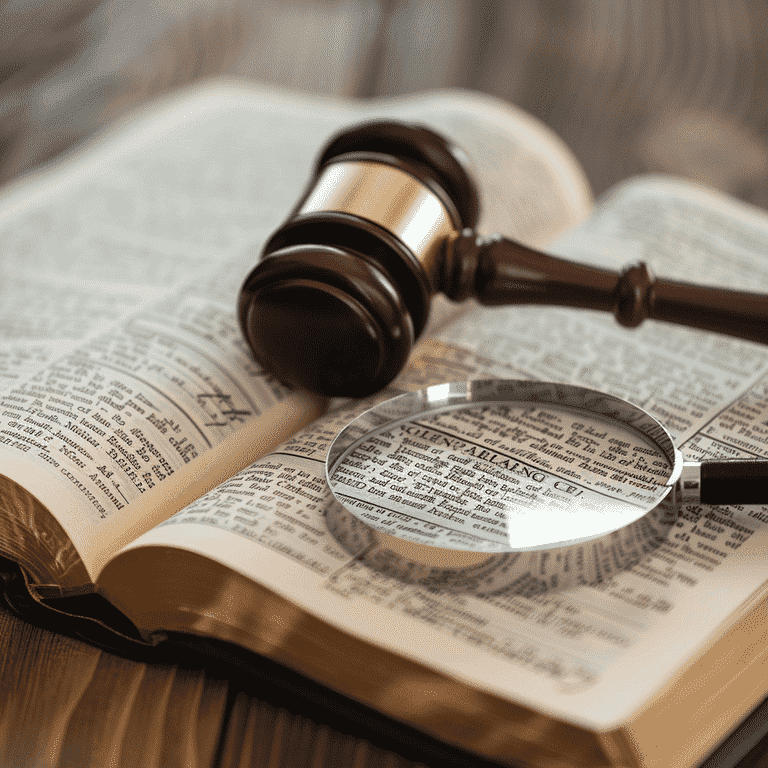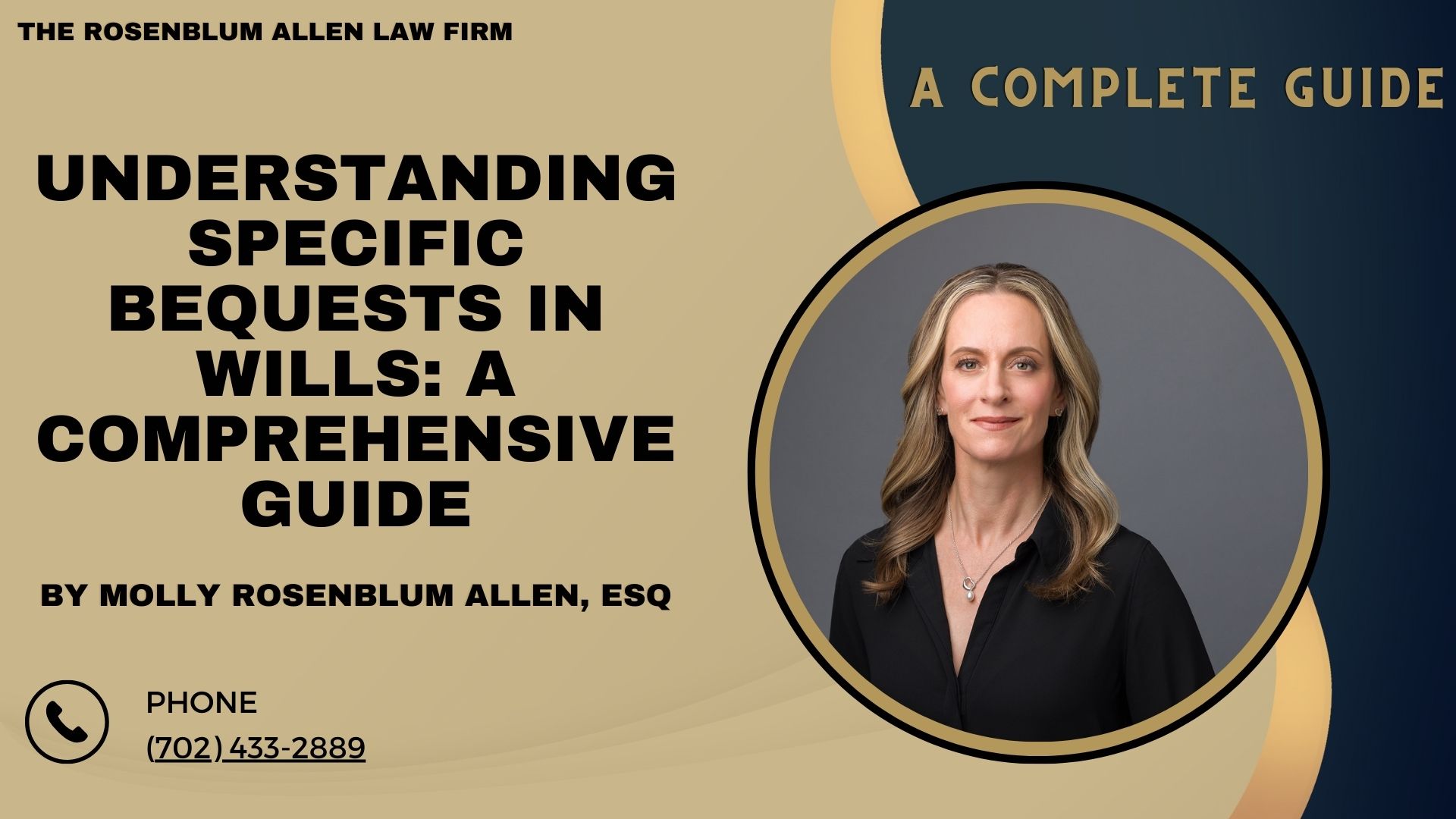When planning for the future, the clarity of your estate wishes is crucial. Specific bequests in a will are a key tool in estate planning. People can specify how certain assets are distributed when they die. This guide explains the nature, importance, and details of making specific bequests in your will.
Definition of Specific Bequests
A specific bequest is leaving an item to someone in your will. General bequests divide money. But, specific bequests pinpoint exact things. These things could be a family heirloom, real estate, or shares in a company.
Importance of Specific Bequests in Estate Planning
Making specific bequests ensures that your assets are distributed according to your wishes. They help avoid confusion. They cut disputes among heirs. They also ensure special items go to your chosen individuals. By including these in your will, you can give meaningful gifts to loved ones. This will ensure that your vision for your legacy lives on.
The Nature of Specific Bequests
Understanding the different types of bequests is vital to effective estate planning. Each type has its unique characteristics and implications for your estate plan.
Differentiating Between Types of Bequests
Various bequests. Each type serves a different purpose and set of circumstances. Here’s a quick breakdown:
Specific Bequests: Target particular items or assets to be given to specific beneficiaries. These are unequivocal.
General Bequests: Involve leaving an available amount of money or percentage of the estate’s value to beneficiaries.
Demonstrative Bequests: Specify a monetary gift that should be paid out of a particular account or source.
Residuary Bequests: Encompass all remaining assets after fulfilling specific, general, and demonstrative bequests.
Examples of Specific Bequests
For example, specific bequests can range from tangible items. These items include jewelry, art, and vehicles. They can also be intangible assets like stocks or bonds in a particular company. For instance:
A grandmother bequeaths her diamond wedding ring to her granddaughter.
A collector leaves a specific vintage car from his collection to a lifelong friend.
An investor designates 100 shares of a particular stock to a favorite charity.

The Nature of Specific Bequests
When planning your estate, deciding who gets what is a big part of the process. This is where specific bequests matter. Upon your passing, a specific bequest is a gift of a particular piece of property or asset. It goes to a specific person or organization.
Differentiating Between Types of Bequests
Specific Bequests: These are clear and precise gifts. Think of them as your grandmother saying, “I want my emerald necklace to go to my granddaughter, Ella.”
General Bequests: These are more about monetary amounts or percentages of your estate, not tied to any particular item.
Demonstrative Bequests: These are a mix of specific and general bequests, such as a certain amount of money from a separate account.
Residuary Bequests: Whatever is left after the other bequests have been made.
Examples of Specific Bequests
A cherished family photo album to a sibling.
A specific sum of money from a designated bank account to a favorite charity.
Your vintage car collection to a lifelong friend.

Legal Requirements for Specific Bequests
Making a will is serious business. You must state your wishes. Make sure the law recognizes them.
Validity of a Will
For a will to be valid, there are a few boxes you need to tick:
Legal Capacity to Make a Will: You need to be of legal age and have the mental capacity to make decisions.
Requirements for a Will to Be Considered Valid: This usually includes being in writing, signed by you, and witnessed by others.
Proper Documentation of Specific Bequests
Getting the details right is crucial:
Clarity in Description: Ensure each specific bequest is described clearly enough to avoid confusion.
Witness Requirements: Generally, you’ll need two witnesses to sign the will, confirming they saw you sign it or heard you acknowledge it.

Benefits of Including Specific Bequests in Your Will
Why worry about saying who gets your vintage comic book collection? Or, the pearl earrings your grandmother left you? Here are a few good reasons:
Ensuring Your Wishes Are Honored
Specific bequests leave no room for doubt. They’re your voice after you’re gone. They make sure to carry out your wishes as you intended.
Minimizing Disputes Among Beneficiaries
Clear instructions help prevent family disputes. When everyone knows exactly what you want, there’s less room for argument.
Providing for Loved Ones and Charities
Specific bequests allow you to care for the people and causes you care about most. The gifts can mean the world to the recipients. They might be sentimental or valuable.

Challenges and Considerations with Specific Bequests
But it’s not all straightforward. There are a few potential hiccups:
Potential for Assets to Deplete or Not Exist
What if the specific asset you want to bequeath isn’t part of your estate when you die? It’s something to consider when making specific bequests.
Changes in the Value of Specific Items
The value of certain items can fluctuate. An art piece worth thousands today might not have the same value.
Dealing with Jointly Owned Property
Things can get complicated if you want to bequeath something you own to someone else. You need to understand how joint ownership affects your ability to make a specific gift.
This first dive covers specific bequests in wills. It shows the need for careful planning and clear communication. It may be a treasured heirloom or money. These bequests keep your legacy alive. They make sure to honor your wishes and take care of your loved ones.
How to Make a Specific Bequest
A specific bequest involves more than just a wish. It needs careful planning and clear documents.
Identifying Items or Assets to Bequeath
Start by listing items or assets that hold sentimental or financial value. This could be anything from family heirlooms to stocks. It could also be your digital photos.
Determining Beneficiaries
Think carefully about who you want to inherit each item. Consider the emotional and practical implications for each beneficiary.
Consulting with Legal and Financial Professionals
A professional can help ensure your will meets legal standards. They can also document your specific bequests. They can also offer advice on potential tax implications.
Tax Implications of Specific Bequests
Taxes can greatly affect your estate. They also impact the value of specific bequests you leave. Here’s what you need to know:
Federal Estate Tax Considerations
Most estates won’t owe federal estate tax. But, it’s crucial to understand how these taxes could impact larger ones. For tax purposes, your estate includes specific bequests in its value.
State Estate and Inheritance Tax Considerations
Some states have their own estate or inheritance taxes. The rules vary widely, so it’s essential to check the laws in your state.
Impact on Beneficiaries’ Taxes
Beneficiaries do not generally pay income tax on specific bequests. Yet, if an asset generates income (like rental property), it may be subject to taxes.
Modifying or Revoking Specific Bequests
Life changes, and sometimes, so do your wishes for your estate. Understanding how to adjust these bequests is crucial.
Legal Process for Changes to a Will
You must supplement your will or create a new one to change a legacy. This process must follow the same legal formalities as the original will.
Circumstances Leading to Modifications
Marriages, divorces, births, and deaths can cause big changes. They can prompt a revision in your relationships or finances.
Effects of Revocation on the Overall Will
Revoking a specific bequest doesn’t invalidate the rest of your will. The rest of your estate plan stays as it was. But, it’s wise to review and may update other parts of your will to reflect these changes.
In this part, we’ve covered some tricky parts of specific bequests. These parts range from logistics to the law and emotions. It’s about navigating complex jointly owned property. It’s also about adjusting to life’s changes and understanding tax. Thorough planning and professional guidance are vital. Remember, the goal of specific bequests is not just to give out your assets. It’s to do so in a way that honors your life, relationships, and legacy.
Specific Bequests and Digital Assets
Today’s digital age is different. Your online presence, digital files, and virtual assets are a big part of your estate. Knowing how to include these in your will can help you ensure that you handle your digital legacy as you wish.
Understanding Digital Assets
Digital assets include a wide range of electronic records:
Social media accounts (Facebook, Instagram, Twitter)
Digital photo and video libraries
Online banking and investment accounts
Cryptocurrency
Digital music, books, and movie collections
Blogs and domain names
Including Digital Assets as Specific Bequests
To bequeath digital assets:
Inventory Your Digital Assets: Make a comprehensive list of your digital assets, including login credentials and how you’d like each asset handled.
Choose Beneficiaries for Digital Assets: Decide who should receive each digital asset. Some assets, like photos, may have sentimental value, while others, like cryptocurrency, may have significant financial value.
Legal Considerations: Be aware that laws governing digital assets are evolving. Some platforms have their policies for handling accounts after an owner’s death, so it’s essential to consult legal advice to ensure your wishes can be legally enforced.
Managing Access and Security
Secure Storage of Information: Keep your list of digital assets and login information safe but accessible to the executor of your estate or a trusted family member.
Use of Digital Legacy Tools: Some platforms, like Google and Facebook, offer “legacy” or “inactive account manager” options, allowing you to designate someone to manage your account after passing.
Case Studies: Specific Bequests in Action
Real-life scenarios can teach us a lot. They show the importance and impact of specific bequests.
Successful Specific Bequests and Their Impact
Case Study 1: A renowned artist bequeathed her digital artwork collection to a national museum, ensuring her legacy lives on through public enjoyment and appreciation.
Case Study 2: A grandfather specified in his will that his collection of rare historical letters, carefully digitized over the years, would be given to his grandson, a history professor. This gift provided invaluable material for research and teaching.
Resolving Disputes Over Specific Bequests
Disputes can happen. But, clear writing and talking can often stop or fix them.
Case Study 3: After a dispute over a valuable piece of jewelry mentioned in a will, family members could agree to mediation, respecting the decedent’s original wishes.
Case Study 4: A specific legacy of a family vacation home to one sibling caused tension. However, the will also included provisions for other assets of equal value to be distributed among the other siblings, which helped maintain family harmony.

Breaking It All Down
We’ve covered making specific bequests in your will. We discussed their nature and how to challenge them. We also covered managing digital assets and learning from others’ experiences. It’s clear that the process can seem daunting. But, the peace of mind and clarity it brings to you and your beneficiaries are immeasurable. By planning, talking, and getting professionals’ help, you can ensure your legacy is preserved. It will be passed on as you wish.

Frequently Asked Questions
How can I ensure my specific bequest of a digital asset is honored if the platform has its own legacy policies?
Review the platform’s policies for deceased users’ accounts to ensure your bequest is honored. Many platforms allow setting up legacy contacts or deciding about your account posthumously. Include instructions in your will reflecting these policies. Provide the executor with necessary access information and your wishes.
Are there assets that cannot be included as specific bequests in a will?
While most tangible and intangible assets can be included, exceptions exist. Assets you do not solely own or those with designated beneficiaries, like life insurance policies and retirement accounts, are examples. It’s also challenging to leave specific bequests of pets in some jurisdictions, though arrangements can often be made for their care.
What should I do if the value of a specific bequest significantly changes before my death?
If concerned about asset value fluctuations, add a clause to your will addressing this risk. Specify adjustments or alternative arrangements if the asset’s value changes dramatically. Regularly review and update your will to manage this issue effectively.
How do I handle specific bequests when moving to a different state or country?
Laws on wills and estates vary, affecting specific bequests. Consult an estate planning attorney in your new location. They’ll ensure your will complies with local laws. This ensures your specific gifts remain valid and enforceable.
Can I make a specific bequest to a charity?
Yes, you can make specific bequests to charities. Endowments can be money, property, or valuable items. Use the charity’s legal name and include necessary details for easy identification and location.
What happens to a specific legacy if the beneficiary predeceases me?
If a named beneficiary dies before you without alternate instructions, the legacy goes to your estate. It’s distributed by the residuary clause of your will. To avoid this, include a secondary beneficiary for each bequest.
Can specific bequests be conditional upon the beneficiary meeting certain criteria?
Yes, you can make specific bequests conditional. For example, requiring a beneficiary to reach a certain age or achieve a milestone like graduating from college. Ensure conditions are legal, not against public policy, and practical to enforce.
How do I revoke a specific bequest after my will has been made?
To revoke a specific bequest, create a new will or add a codicil to your existing one. Both methods must follow the same formalities as making a will. Witnesses must sign them in their presence.

Glossary
Asset: A property owned by a person or company, regarded as having value and available to meet debts, commitments, or legacies.
Beneficiary: An individual, group, or organization designated to receive benefits or assets under a will or other legal document.
Bequest: The act of giving or leaving personal property through a will.
Codicil: A legal document that modifies, deletes, or adds to the content of an existing will.
Digital Asset: Any text or media formatted into a binary source that includes the right to use it. Digital assets can range from websites, digital photos, and social media accounts to email and digital storage accounts.
Estate: The total property, assets, and liabilities an individual leaves at death.
Estate Tax: A tax levied on the net value of the estate of a deceased person before distribution to the heirs.
Executor: A person or institution appointed by a testator to carry out the terms of their will.
General Bequest: A monetary gift in a will that does not specify from which asset the money should come.
Inheritance Tax: A tax imposed on individuals who inherit property or money.
Jointly Owned Property: Property owned by more than one person, where each owner has a legal right to the property’s assets and is subject to its liabilities.
Legal Capacity: The legal ability to enter into a binding contract. In the context of wills, it refers to the individual’s ability to make a will, including being of legal age and sound mind.
Residuary Bequest: A gift of all or a portion of the remainder of an estate after all other legacies, debts, taxes, and expenses have been distributed or paid.
Specific Bequest: A gift of a particular piece of property or a specific item to a designated beneficiary, as stated in a will.
Testator: A person who has made a will or given a legacy.
Will: A legal document by which a person, the testator, expresses their wishes as to how their property will be distributed at death and names one or more persons, the executor, to manage the estate until its final distribution.

Additional Resources for You
As you continue to navigate the intricacies of estate planning, we want to remind you that our lead attorney, Molly Rosenblum Allen, Esq., has meticulously crafted additional resources to assist you in your time of need. These resources have been designed to provide you with comprehensive information, practical tips, and insightful guidance across various aspects of estate planning.
Explore Our Valuable Resources:
Las Vegas Estate Planning Attorney: Dive deep into the realm of estate planning with our specialized services. Learn More
Las Vegas Trust Attorney: Discover how setting up a trust can benefit your estate planning goals. Learn More
Tips On Estate Planning: Gain practical advice to streamline your estate planning process. Learn More
Estate Planning Checklist: Ensure you’ve covered all bases with our comprehensive estate planning checklist. Learn More
Making a Will: Understand the critical aspects of creating a will that reflects your wishes accurately. Learn More
Estate Planning Services: Explore our full range of estate planning services tailored to meet your unique needs. Learn More
Estate Planning Mistakes: Learn about common estate planning mistakes to avoid. Learn More
Estate Planning Probate: Get insights into navigating the probate process as part of your estate planning. Learn More
Molly Rosenblum Allen, Esq., and the team at The Rosenblum Allen Law Firm are committed to providing you with the knowledge and tools necessary for effective estate planning. We understand the importance of preparing for the future and are here to guide you every step of the way.

Outside Resources for You
American Bar Association (ABA): A premier resource for legal information, including estate planning and wills. Visit ABA
National Association of Estate Planners & Councils (NAEPC): Offers insights and resources for comprehensive estate planning. Visit NAEPC
WealthCounsel: A professional community providing estate planning and business law education. Visit WealthCounsel
EstatePlanning.com: Provides information about estate planning, wills, trusts, and more. Visit EstatePlanning.com
FindLaw: Offers a broad range of legal resources, including guides on estate planning and wills. Visit FindLaw
Nolo: Known for its do-it-yourself legal books and software, Nolo provides clear legal information on estate planning. Visit Nolo
The Balance: Features articles and resources on financial planning, including estate planning and managing assets. Visit The Balance

A Special Message from Our Lead Attorney, Molly Rosenblum Allen, Esq

Dear Valued Reader,
Thank you sincerely for exploring our guide. It covers specific bequests in wills. We hope you’ve found the information enlightening. It has given you clarity and direction for the future.
At The Rosenblum Allen Law Firm, we know that estate planning is personal. It reflects your life, values, and wishes for your loved ones.
We are committed to guiding you.
We will provide the support and expertise you need. These will help you navigate these key decisions with confidence and safety.
I invite you to schedule a free consultation with our team. We will help you in your estate planning journey. Do you have questions about bequests? Do you need advice on making a will? Or are you looking for complete estate planning services? We are here to help.
Please call us at (702) 433-2889 to arrange your consultation. This is a chance for us to discuss your needs. We can tailor our services to meet your goals.
Thank you once again for engaging with our resources. We look forward to the opportunity to serve you and help secure your legacy.
Warm regards,
Molly Rosenblum Allen, Esq.
The Rosenblum Allen Law Firm





